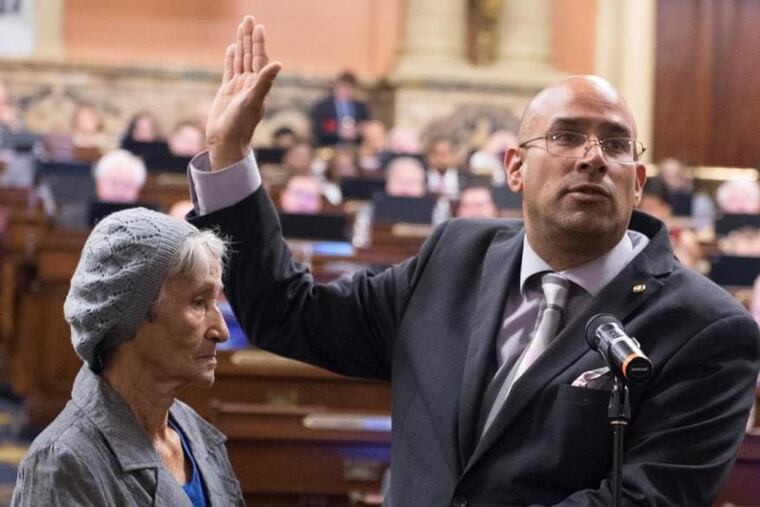Overheard at Philly polling place: No GOP votes 'on my machine!'
An elderly couple thought they both voted for a Republican. But only one GOP vote was recorded.

An elderly couple wanted to vote for the Republican in a 2017 special election in North Philadelphia.
First they were told they had to go "get a stamp" outside the polling place — where Democrats handed out stamps for write-in candidates. Then, when an Election Board worker heard they wanted to vote Republican, a witness heard him bellow: "Not on my machine!" And though they both said they eventually cast ballots, in the end only one GOP vote was recorded at the polling place.
Those were some of the allegations to emerge this week from the investigation into Election Board workers who allegedly interfered with the March 21 race for the state House's 197th District. Four Democrats are awaiting trial on charges of committing fraud, intimidating voters and tampering with public records at the polling site at the Esperanza Health Center in the 43rd Ward.
Though state prosecutors say the outcome of the election wasn't compromised — the ward's Democratic leader, Emilio Vazquez, won with 73.5 percent of the vote, via write-ins — the case offers a window into supposed dirty election operations by some in the city's powerful Democratic machine, in an area where several political shenanigans have been reported over the years. Fair or not, the allegations could feed the perception among Republicans (and some Democrats) that election mischief is rampant in parts of Philadelphia.
During a preliminary hearing Monday for two of the Election Board workers — Dolores Shaw, the judge of elections, and Thurman George, the machine inspector — voters from the site made several notable claims under oath:
A man who wanted to vote for write-in candidate Cheri Honkala brought a photograph of her. "At the entrance, they told me no, that I should hide that [image] away," he said. Then, when he went into the voting booth, he said his machine "locked itself," leaving him unsure of whether he successfully cast a ballot. "I have voted all my life," he said. "I never had that problem." Although this man was the last voter at his polling place on Election Day, the final vote recorded there was for Vazquez, according to the Attorney General's Office.
Another witness said he watched George follow the aforementioned male voter around the polling place. He said that the voter's machine "got stuck," and that a separate man went behind his machine afterward.
A volunteer for Honkala said George asked her whom she was voting for at the polling place. She said she tried to vote a few times before she was ultimately able to do so. Election Board workers told her she couldn't cast a ballot, she said, because they "didn't have a judge of elections yet." Later, when she tried to help a male neighbor vote for Honkala, she said, Election Board workers told the man that "there are people at the polling place to assist him" and he didn't need the volunteer's help. He "felt intimidated and he wanted to leave," she said.
Deputy Attorney General Nicole Forzato said that as judge of elections, Shaw's job was overseeing the polls. But Shaw's silence in the face of these fiascoes, the prosecutor said, "prevented a free and fair election." Forzato also said that Shaw had tampered with election records as part of a cover-up.
Defense attorneys for Shaw said that she "didn't intend or try to mislead anyone," and that there was "no evidence that she was aware of the problems" that took place that day. George's defense attorney said that "he didn't tamper with any records" and "didn't tamper with any machine."
Municipal Court Judge Bradley Moss dismissed two charges against Shaw for repeat voting and hindering her duties, as well as one charge against George for repeat voting. He allowed the other charges to stand. A formal arraignment for the two Election Board workers is scheduled for Feb. 5.
Two other poll workers at the Esperanza Health Center, Calvin Mattox and Wallace Hill, were charged with several felonies and misdemeanors in October by the office of Attorney General Josh Shapiro. They waived their right to a preliminary hearing. Several complaints of illegal electioneering were made in the 197th District's special election.
The area is not a newcomer to such allegations. State Rep. Angel Cruz, leader of the Seventh Ward, was arrested in 1999 for allegedly trying to pay people to vote for him in a ward race. The charges were ultimately dropped after a jury failed to reach a verdict. In 2015, Councilwoman Maria Quiñones-Sánchez and her challenger, Manny Morales, each accused each other's campaigns of fraud. The Seventh and 43rd Wards, which are next to each other, are in Sánchez's district.